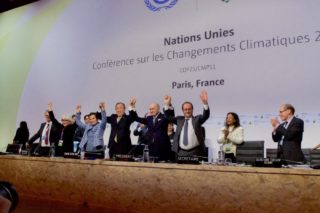-
Cautious optimism growing around Paris Agreement on its fifth anniversary
Date posted:
-
-
-
Post Author
Patrick LaveryCombustion Industry News Editor
-

On the fifth anniversary of the signing of the Paris Agreement on Climate Change, the Financial Times has published an interesting article on how expectations of meeting the agreement’s goals have been changing. In 2009 (well before the agreement), projections were that with the then current policies, the world would be 2.7-4.3 oC warmer than average temperatures between 1850-1900 by 2100. With the Paris Agreement in 2015, this fell to a range between 2.2-3.9 oC, but rose again in 2017 (after the statement of intent on the part of the US to withdraw from the pact) to 2.6-4.0 oC. Now, however, the range is 1.7-2.7 oC, following the recent net-zero target announcements by China, Japan, and South Korea and the election of Joe Biden to be the next US president. (The projections assume that policies and promises will be fulfilled.) Professor Niklas Höhne of Wageningen University in the Netherlands is one that believes the goals of the Paris Agreement are “within reach again” – on the proviso that countries meet their commitments – and he attributes the Chinese announcement this year of a 2060 carbon-neutral goal of being the game-changer that precipitated other countries into following suit. For him, it is “the biggest impact of the Paris agreement so far.” Professor Chris Rapley of University College London is another that is cautiously optimistic, telling the FT he thinks “the 2C target now looks like it might be possible, whereas frankly previously, a lot of us were pretty cynical about it”. Technological progress, governmental and corporate commitments, and growing political pressure from citizens, as well as a better understanding of the economics of climate change have all played a role in the more optimistic outlook, and of course are all intertwined. Not all are so optimistic, however, and setting targets is different to achieving them. Climate activist Greta Thunberg referred to this in a recent Twitter video, saying that “the action needed is nowhere in sight”, and that “when it comes to the immediate action we need, we are still in a state of complete denial.” Some metrics compiled by the FT belie this – for instance, electricity production from solar power has risen by 182% since the signing of the Paris Agreement, and wind is up 72%, while oil is down 19%.
